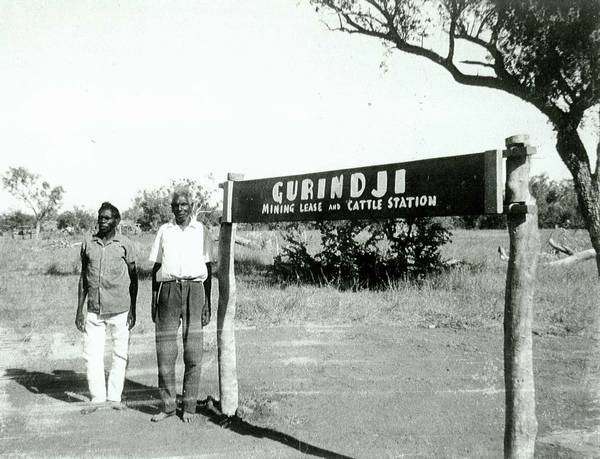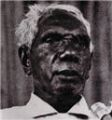
This was probably the first time Gurindji people had seen their name for themselves written down.
Source: National Archives, of Australia, Darwin
From wage rights to land rights
In August 1966, Aboriginal pastoral workers walked off the job on the vast Vesteys' cattle station at Wave Hill in the Northern Territory. At first they expressed their unhappiness with their poor working conditions and disrespectful treatment. Conversations between stockmen who had worked for Vesteys and Dexter Daniels, the North Australian Workers' Union Aboriginal organiser, led to the initial walk off.
The next year the group moved to Wattie Creek, a place of significance to the Gurindji people. They asked Frank Hardy to 'make a sign' which included the word 'Gurindji', their own name for themselves. Their disaffection was deeper than wages and working conditions.
Although these stockmen and their families could not read, they understood the power of the white man's signs. Now their name for themselves, written on a sign, asserted a claim to Gurindji lands.
I bin thinkin' this bin Gurindji country. We bin here longa time before them Vestey mob. Vincent Lingiari. [1]
In 1967 after hearing Minister for the Interior Peter Nixon's plan to dismiss the Gurindji claim to their land, Ted Egan wrote 'Gurindji Blues'. A singer/songwriter who had a long association with Aboriginal people in the Northern Territory, Egan listened to the Gurindji people and recorded their views about land in the song.
'Gurindji Blues' was recorded by RCA records in 1971 with a young Yolngu spokesman, Galarrwuy Yunupingu, accompanying Egan.
'Gurindji Blues'
Courtesy Ted Egan
Download 'Gurindji Blues' [MP3 2918kb]
View 'Gurindji Blues' transcript
Footnotes
1 Frank Hardy, The Unlucky Australians, One Day Hill, Melbourne, 1968; this edition London, 1981, p. 131.
